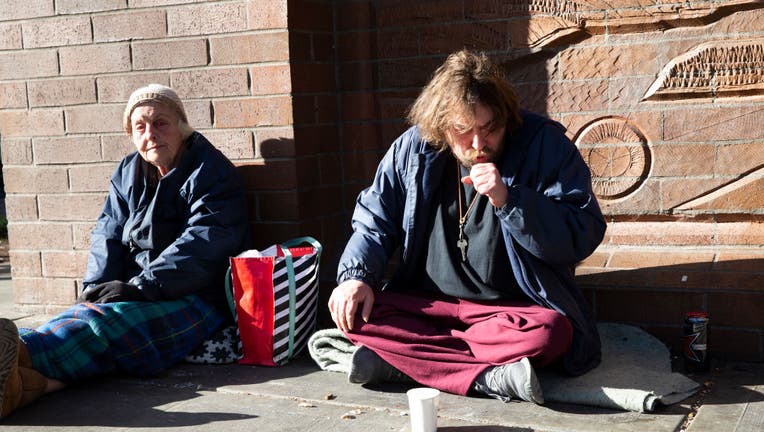People who experienced homelessness help others in Seattle

(Photo by Karen Ducey/Getty Images)
SEATTLE - A new program in King County is tapping people who have experienced homelessness in the past to help currently homeless people get off the street. The King County Regional Homelessness Authority hopes the program will get nearly every person living outside downtown into long-term, stable housing.
Kirk Rodriguez does outreach work talking to people around Pioneer Square. Rodriguez used to be homeless when he moved to Seattle six years ago. After about two years on the street he got into state-sanctioned housing. Rodriguez says when he was figuring out where to live and finding other services he needed, he did it alone — he didn’t have anyone to help guide him through the process.
"No, I did not, I wish that I had," he told KUOW near City Hall Park recently. "It would have made a huge difference."
Rodriguez works on the City Hall Park Neighborhood Outreach Team, a group of about eight who go out multiple times a day to check with people in the area. The team gives out food, hand warmers, and toiletries like tampons and condoms.
"If there’s somebody who’s looking like maybe they’re having a rough day or could use some snacks or whatever else, we’ll engage," Rodriguez said. "We make sure to say hi no matter what."
Some people are in tents next to the Pioneer Square light rail station. Others hang out at the nearby fountain, where, on a recent trip, nearly everyone recognized Rodriguez and his colleague, Shelby George.
"Everyone knows everyone, kind of the watering hole down there at that fountain," George said. "So, just checking on everyone, make sure they’re okay."
Rodriguez said it’s important for people like him with real-life experience to be doing this kind of work.
RELATED: Seattle testing 'point-based system' to prioritize, remove homeless encampments
"People who have experienced homelessness know the most about it," he said, "and just how to approach systems, how to navigate them, issues people interact with not just at face value, not just that like understanding from reading or hearing about it but having actually lived it."
This outreach team is small — focused just on City Hall Park and adjacent side streets. But starting this summer, a similar program is taking off in King County and it’ll be much bigger with more peer counselors — 30 to start.
Zaneta Reid is co-director of the Systems Advocate Peer Navigation Workforce at the King County Regional Homelessness Authority.
"Filling in those gaps where outreach and case management just don’t have the bandwidth to come in and really walk alongside somebody," Reid said over a Zoom interview.
The peer navigators or, as Reid calls them, "systems advocates" will work with people one-on-one to help get them into housing, make sure they have the right documents, and show up to medical appointments.
RELATED: Sweltering streets: Hundreds of homeless die in extreme heat across US
"The systems advocate will basically be like their timekeeper, their parliamentarian," she said.
Each advocate will have a caseload of about 15 people. Reid acknowledges peer advocacy won’t cover every person experiencing homelessness in the county. But she says they’re focusing on downtown Seattle first, with plans to expand to up to 70 systems advocates.
Another co-director of this team, Joe Conniff, says they’ll work with people to make sure they don’t return to homelessness.
"There may be cases where, you know, our system advocates are getting results, getting somebody placed, and that person is achieving stability and that maybe can happen in six to eight months," Coniff said, "where some folks we could see, you know, a 24-month relationship, if that’s what it takes."
Conniff, who also has been homeless before, says partnering people up with a peer helps build trust — and gets people into the right services for their needs.
"Is this appropriate and competent for you as an individual that speaks this language that has this racial or gender identity or sexuality, that this is safe and supportive and what you need as an individual to thrive, peer support does that very well," he said.
Peer relationships have been around before, but Zaneta Reid says they have often focused on specific groups like veterans or families and children.
"This is the first that I’ve seen where it’s not just a specific population except for just unhoused," Reid said.
Kirk Rodriguez in Pioneer Square wishes the new program good luck and agrees there needs to be more peers out on the street.
The big problem, he says, is insufficient housing.
"If you go up to somebody and say, ‘Well, what do you need?’ and they’re experiencing homelessness — be ready for them to say probably what you can’t give, which is just an apartment," Rodriguez said.
There are some temporary shelter options in Seattle, he said, just not enough right now.

